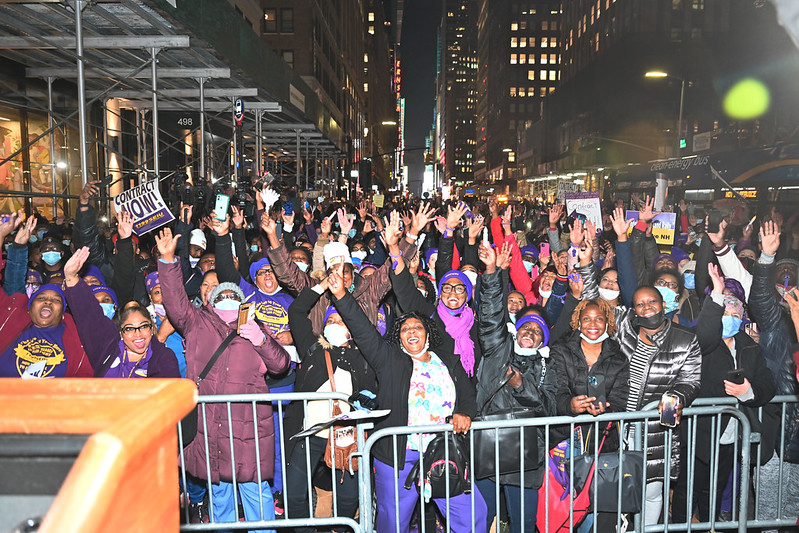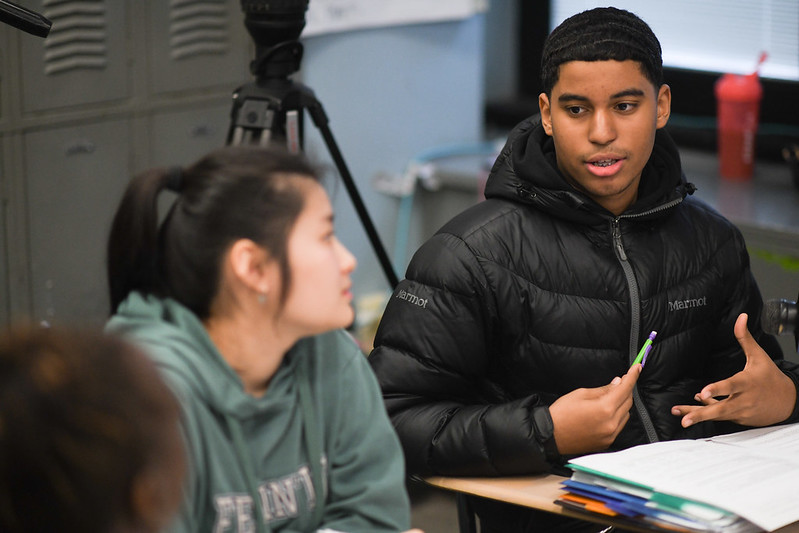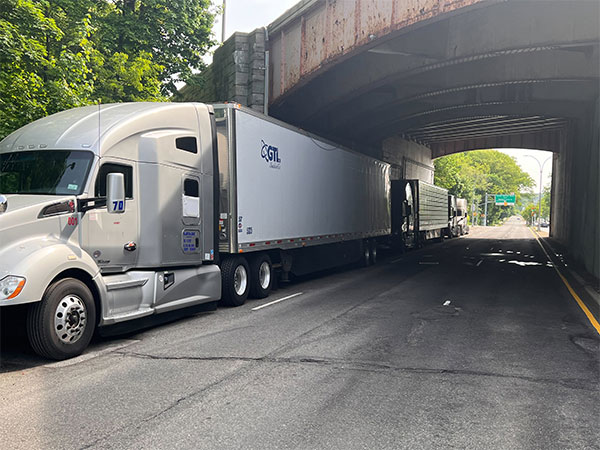Lessons from the Frontlines of Successful Movement Building in 2022

A labor rally (photo: Kevin P. Coughlin/Office of the Governor)
Throughout the pandemic, our nation’s essential workers risked their lives and that of their families to fuel our economy and keep us safe. Yet, as they did so, they received inadequate pay and were often left out of the process of crafting policies supposedly intended to protect them. All the while, , and executive compensation skyrocket. It’s no wonder record numbers of workers are rising up, taking action, and demanding change.
Every day we are inspired by stories of working people using organized bargaining power to establish true economic democracy. What we’ve witnessed from millions of workers is a recognition that if they want to achieve a better path, they can create change through collective actions and demand a seat at the table. No longer must they passively wait on politicians to change the laws or craft the perfect strategies. People are organizing, speaking out on their shared experiences and struggles, and despite the odds, winning basic protections and benefits in the workplace all across America in 2022, from Amazon to Starbucks to REI and The New York Times.
It is especially gratifying to see a whole new generation of women and workers of color and others for whom the COVID-19 era has been disproportionately painful leading the way. Undoubtedly, Black, Latino, and other workers of color bring a novel perspective to building worker power and what labor organizing could look like in the future. They’re also suggesting ways to evolve collective bargaining to match the needs of modern people — not only changing their wages and working conditions but also addressing discrimination and improving the health of our democracy.
For far too long, America’s labor movement and workers’ rights have fallen victim to relentless attacks and successful divide-and-conquer strategies from corporations, right-wing politicians, and other powerful institutions, including the media, which have largely concealed what was happening. The result has been extreme income inequality, with Americans working longer hours than ever before in unsafe conditions and feeling little social mobility.
It’s no wonder working people are angry — they’re tired of waiting for a better future that may never arrive, especially after sacrificing so much during the pandemic over the past two years. Also noteworthy is that workers’ increased activism and high-profile victories come amid record-low unemployment and public support for labor unions, reaching 68%, the highest level in more than five decades. Not that any of this translates to corporations – like Amazon, Starbucks, Target, Google, and Apple – suddenly respecting workers’ rights to organize, negotiating in good faith, and improving working conditions.
For as long as we can remember, institutions have trained working people and communities of color, in particular, to think we have no future to believe in, so why even try. The recently leaked U.S. Supreme Court draft opinion on abortion rights offers a glimpse into the future that our opposition has in store. Overturning Roe v. Wade would be the most egregious assault on women’s rights and equality, access to health care, and right to privacy in modern history – erasing decades of economic gains. Such a ruling would be especially devastating for poor and working-class women, a disproportionate number of whom are Black, Latino, and Asian.
This is not what democracy looks like.
After being bombarded for so long with so much bad news, it’s a wonder any of us get out of bed in the morning. But action is the oxygen that fuels social movements, and we descend from those who knew that “only when it’s dark enough can you see the stars.”
Amazon Labor Union leaders Chris Smalls, Michelle Valentin Nieves, and Angelika Maldonado didn’t just give up amid arrests and the onslaught of attacks from the company. They organized a union and won. Jennifer Bates, Isaiah Thomas, and other bullied Amazon workers in Bessemer, Alabama – whose activism and bravery inspired so many others to take action – didn’t give up after the company undermined democracy in their union election. They came back and won more votes in a race that remains “too close to call.” The women leading the drive to successfully unionize Starbucks across the country (at 40 stores and counting) didn’t give up, and neither will we.
We urge elected officials and anyone else hand-wringing about the upcoming elections to follow workers’ lead, mobilizing like never before to protect our sacred freedoms up and down the ballot. Instead of succumbing to fear of a world where right-wing extremists control Congress and every statehouse and governorship in America, let’s put our energy toward creating a future where our democracy can thrive.
***
Erica Smiley is Executive Director of Jobs With Justice. Micaela Fernandez Allen is Director of U.S. Advocacy, Open Society Foundation. On Twitter @SmileyJWJ and @MJFernandez2.
***
Have an op-ed idea or submission for Gotham Gazette? Email This email address is being protected from spambots. You need JavaScript enabled to view it.
Alarming Workforce Shortage Facing Youth Mental Health Care Workers

NYC Youth (photo: Michael Appleton/Mayoral Photography Office)
Many industries are struggling with their workforce since the pandemic, and the children’s mental health workforce is no different. Capacity and workforce retention have always been a challenge in the human services field, with providers expected to do more with less and families facing increasingly longer backlogs and wait times for appointments.
Statistics show that 1 in 6 U.S. youth experience a mental health condition each year, but only half get treatment. In addition, 59.6% of youth with major depression do not receive any treatment. In the Bronx, where our organization does much of its work, the three top diagnoses for program participants ages 8 to 17 are attention deficit hyperactivity disorder (ADHD), depressive disorder, and disruptive/oppositional disorder. These three make up over 60% of the overall primary diagnoses for those youth in the borough.
At Astor Services for Children & Families, over 50% of Bronx program participants identify as Hispanic. This means that besides the need for enhanced salaries to retain and attract competent staff, we also need to provide culturally and linguistically sensitive services.
Agencies like ours are working miracles to recruit and retain talented employees but are having a tough time competing with city agencies like the Department of Education and for-profit competitors (some even located outside NY), that in some cases can offer twice the salary and benefits. Remote employment, COVID-19 health concerns and other unprecedented back-to-work factors are further complicating matters of employee retention and satisfaction. Astor and local agencies cannot compete at this level.
To turn around this current trend in underemployment, public investments must be made. We also need to allow employers sustainable reimbursement rates to be able to compete with larger entities and providers.
Expanding funding and reimbursements for outpatient and school-based health clinics will enable us to reach more clients and families and allow us to partner with and integrate mental health within school buildings through a hybrid format (both in-person and tele-health) as needed by clients and staff. We must increase the rates for residential treatment facilities and raise tuition rates for non-public schools that serve children with disabilities to create parity within the industry and across sectors.
Considering the underserved and underrepresented populations that we provide services to, Astor is seeking to expand and reinvest in its bilingual Spanish workforce that will enable the organization to hire Spanish-speaking clinicians and non-clinical staff, but also to provide the right professional development opportunities to our current staff so that we can create an internal language bank to provide the best service and support possible.
I remain optimistic that with public awareness, we can secure increased funding to continue to further develop a multicultural mental health workforce that will provide the vital services for our most vulnerable children and families. It should be everyone’s imperative.
***
Yvette Bairan is CEO of Astor Services for Children & Families a nonprofit organization that provides children’s mental health services, child welfare services and early childhood development services in the Bronx and Hudson Valley, New York. On Twitter @AstorServices.
***
Have an op-ed idea or submission for Gotham Gazette? Email This email address is being protected from spambots. You need JavaScript enabled to view it.
It’s Time to Deliver Our Neighborhoods from Illegal Commercial Truck Parking

Illegal truck parking in Queens (photo: Daniel Sparrow, Council Member Linda Lee's office)
No matter where you look in Eastern Queens, it seems like there’s a commercial truck illegally parked. Whether it’s along a highway or in a quiet residential neighborhood, these four-ton vehicles are hard to miss. Now, it seems like this long-standing problem is reaching a crisis level citywide. Fines and enforcement alone won’t solve this problem -- we need a comprehensive solution that involves government agencies, elected officials, and the private sector to solve this problem for the long-term.
Around 90% of the goods shipped within New York City are carried by truck. Nearly 9 million New Yorkers rely on these trucks and their drivers for our food, medicine, building materials, and just about everything else that makes our daily life possible. On top of servicing New Yorkers’ needs, trucks also support JFK and LaGuardia airports, two of the busiest in the country and both located in Queens, as well as the Port of New York and New Jersey, the third busiest in the country.
As a result, trucks transport approximately 890,000 tons of freight within New York City each day, with many trucks requiring a berth in which to park each night. That number is expected to grow by nearly 70% by 2045, a trend driven by the rise of e-commerce and home delivery that has only increased during the pandemic.
While trucking across New York City has increased dramatically and will only continue to do so for the foreseeable future, the infrastructure to support these fleets has not kept pace. Currently, there are only two commercial truck parking lots in Queens, at JFK and in Long Island City, both of which are usually at capacity and maintain waitlists for truckers looking for a spot to park. Despite the expected continued rise in commercial trucking in the city, there are no current plans to create new space to park these trucks.
It’s also important to note that truckers have little choice about when to park. Federal regulations limit the number of hours a trucker can drive per day, and they must pull off the road when they hit their hours. Mandatory rests can come in the middle of a shift, or just before reaching the drop-off or pickup point at one of the shipping hubs across the city. As a result, without adequate parking facilities in which to rest, drivers are forced to pull to the side of the road to park overnight, resulting in illegal parking in residential neighborhoods.
The result is a hazard to our neighborhoods, a problem Queens residents are familiar with. Illegal truck parking is more than just an eyesore -- by limiting residential street and highway space, it increases congestion, in turn causing longer travel times, more pollution, and more accidents. Parked trucks contribute to littering and illegal dumping and impair visibility for drivers and pedestrians at intersections. The same neighborhoods where trucks often park lack adequate transportation options and therefore residents primarily use cars to get around. Working-class families in Queens rely on street parking to get to school and work, but often those spots are taken up by trucks parked illegally.
As much as New Yorkers rely on trucks for our daily lives, we’ve also collectively decided that this type of behavior is unacceptable. The New York City Department of Transportation posts “no overnight parking” signs in areas with frequent illegal truck parking, but this limits parking available to neighborhood residents. While the NYPD tickets and cites illegally parked trucks, truckers without anywhere else to park treat these tickets as the cost of doing business.
Senator Leroy Comrie and Assembly Members Clyde Vanel and Alicia Hyndman have authored bills in the New York State Legislature to stiffen penalties for trucks left unattended, and we call for passage of legislation to combat this issue by the end of the state’s legislative session next month.
But this legislation alone won’t fully address the issue until we can offer truckers somewhere else to park besides our neighborhoods. Without that parking, shippers will continue to treat these fines as the cost of doing business, and ultimately pass those costs along to consumers. At a time when inflation is being keenly felt by ordinary New Yorkers, we can’t pretend that an enforcement-only approach doesn’t come with costs.
We cannot approach this problem piecemeal, we need sustainable solutions that address the root cause of the illegal parking problem: the constrained supply of commercial parking. Government and the private sector must work together to develop space that will allow truckers a safe and reliable place to pull over when they have met their maximum hours without causing havoc in residential neighborhoods.
The city Department of Transportation’s Freight Mobility Unit must take the lead in identifying the most commonly used corridors for freight trucks across the city and potential nearby lots that can be used for parking. The city’s Economic Development Corporation can lease city-owned land to a private or not-for-profit entity to develop commercial lots and manage them on behalf of the city. These steps will not only get the trucks off our neighborhood streets, but also generate revenue for the city.
We must also pass state legislation (S3258 and S3259) to raise the fines on illegally parked commercial trucks to provide a real deterrent against continued bad behavior, not the current slap on the wrist that is being ignored. The NYPD must commit to robust enforcement and ticketing, including towing these trucks when necessary to penalize repeat offenders.
The private sector also stands to benefit. For instance, numerous big-box retailers across the city should consider renting out their massive parking lots that sit empty and unused after their stores close each night. Trucking companies would jump at the opportunity to pay for these spots, providing a much-needed shot in the arm to an important economic sector that has struggled greatly in recent years.
The economic trends are clear -- commercial trucks are only going to proliferate across the city in the coming years. Rather than fight against the same drivers and companies that facilitate our daily lives, we must work with them to create the infrastructure they need to avoid negatively impacting our communities.
***
City Council Members Linda Lee and Nantasha Williams co-chair the Queens Delegation of the New York City Council, representing Districts 23 and 27 respectively. Council Member Selvena Brooks-Powers chairs the Committee on Transportation and Infrastructure and serves as the Majority Whip to the Council. On Twitter @CMLindaLee & @CMNantashaW & @CMBrooksPowers.
***
Have an op-ed idea or submission for Gotham Gazette? Email This email address is being protected from spambots. You need JavaScript enabled to view it.




